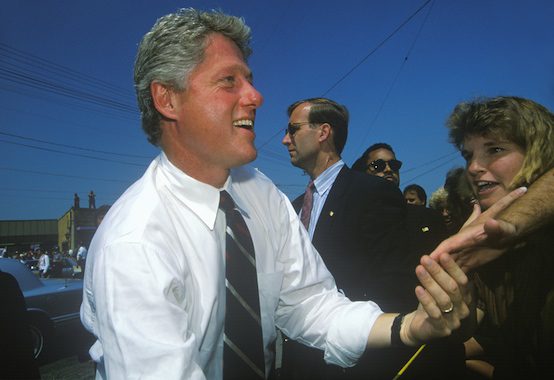Bill Clinton, Republican Role Model

Bill Clinton is playing an unprecedented role in Barack Obama’s campaign. But even more improbably, he has emerged as a star in Mitt Romney’s. The Republican presidential nominee credited Clinton with helping to “elevate” the Democratic National Convention—with a speech that contained slashing attacks on Romney’s proposals and critique of the incumbent administration.
When Clinton gave that speech, Republicans fell all over themselves to compliment him. They remembered the 42nd president as one who reached across the aisle, as opposed to the hyper-partisan Democrat in the White House now.
Top Romney surrogate John Sununu praised Clinton’s “credibility” on the economy. Sununu served as chief of staff to the president Clinton beat in 1992. Paul Ryan went so far as to say that Clinton was reminding voters “how good things were in the 1990s.”
Ryan in particular has tried to suggest his running mate is more like Clinton than Obama. “Under President Clinton, we got welfare reform,” the Associated Press quoted Ryan as saying. “President Obama is rolling back welfare reform.”
Clinton has been featured in the Romney campaign’s ads attacking President Obama on welfare. The commercial’s claim that Obama has gutted the work requirements at the heart of the 1996 reforms is hyperbolic. The Democratic responses have been hyperbolic too. The waivers were not anticipated by the members of who helped write the legislation, but they could in fact lead to states loosening the work requirements. Predictably, Obama simply enlisted Clinton to defend him on welfare reform, thereby undermining the Romney attack’s effectiveness.
Noting that many contemporary conservatives now celebrate liberals they once opposed—Franklin D. Roosevelt, Harry S. Truman, and John F. Kennedy among them—the late columnist Joseph Sobran predicted they would one day embrace Bill Clinton and remain conservatives in good standing. That day has come to pass.
What made the right stop worrying and learn to love Clinton? The Weekly Standard’s Jeffrey Anderson writes of the “$4.351 trillion difference” between Obama and Clinton: “Average annual deficit spending under Clinton was 0.1 percent of GDP, compared to 8.4 percent of GDP under Obama.”
Clinton’s record on government spending and deficits isn’t just better from a conservative perspective than Obama’s. It is superior to George W. Bush’s. The Republican-controlled Congress deserves some of the credit (though their fiscal discipline started to wane as early as 1998). But while Clinton was president, congressional Republicans were trying to cut spending and balance the budget. When Bush took over, they voted for deficits and government growth.
Even the Republicans were better under Clinton.
Obama’s reaction to 2010 was very different from Clinton’s response to 1994 for several reasons. Unlike in ’94, the Democrats narrowly held onto the Senate. This enabled them to kill Republican legislation without forcing the president into every confrontation. But differences between the two men are more important than their different circumstances.
Clinton came from a relatively conservative state and had been rebuked by the electorate earlier in his career for moving too far to the left. He had been forced to tack to the center before. Obama came from a liberal state and had no such experience. What Clinton did to appeal to moderates through policy, Obama has generally tried to do with his personality and rhetoric.
While Obama is a defender of returning the country to Clinton-era tax rates and Clinton appears in a television ad praising Obama’s economic plans, the plain fact is the two men have operated under different ideas of how to grow the economy. Obama isn’t a Kenyan, but he’s certainly a Keynesian. Clinton, meanwhile, believed in stimulating growth through lower interest rates brought about by smaller deficits—a posture that gave him more room to negotiate with Republicans.
Finally, the two have different standards of success. For Clinton, defeating the “vast right-wing conspiracy” at the ballot box was its own reward, even if it meant shelving health care reform and talking about school uniforms instead. For better or worse, Obama wants to have a bigger long-term impact. In 2008, he talked about being a “transformational” president like Ronald Reagan rather than involving himself in the small-ball initiatives that consumed Clinton.
In one respect, however, Clinton is more like Reagan than Obama: he has become so broadly popular that even the political opponents who reviled him now claim to admire him.
Clinton may bear disproportionate responsibility for some grave bipartisan failures—an excessively interventionist foreign policy, an economy built on artificially inflated bubbles, crony capitalism, and an Oval Office that seems like a punch line—but he has been rewarded with bipartisan adoration.
W. James Antle III is editor of the Daily Caller News Foundation and a contributing editor to The American Conservative. Follow him on Twitter.
Comments